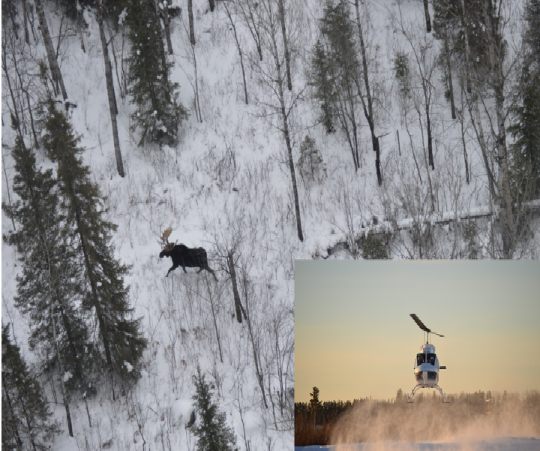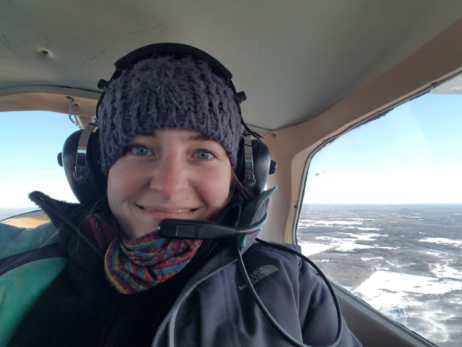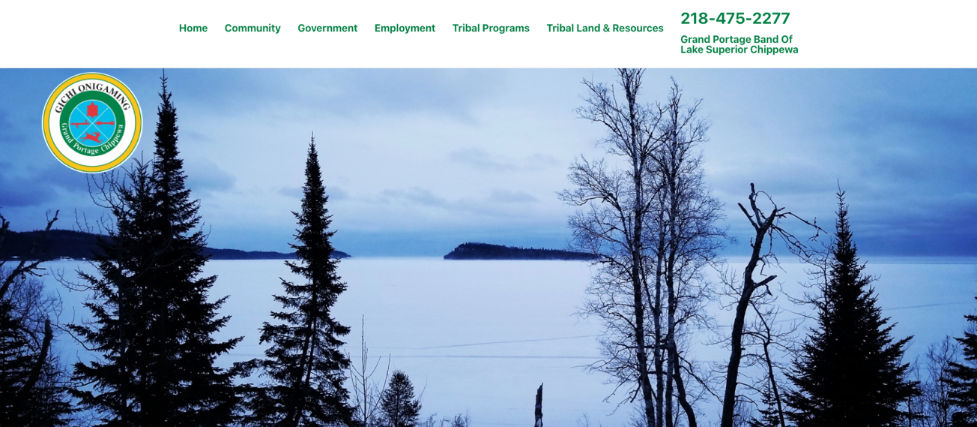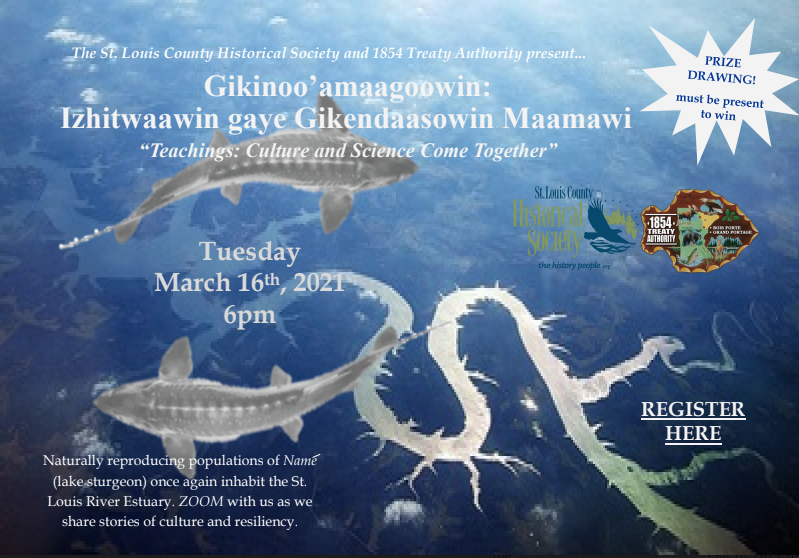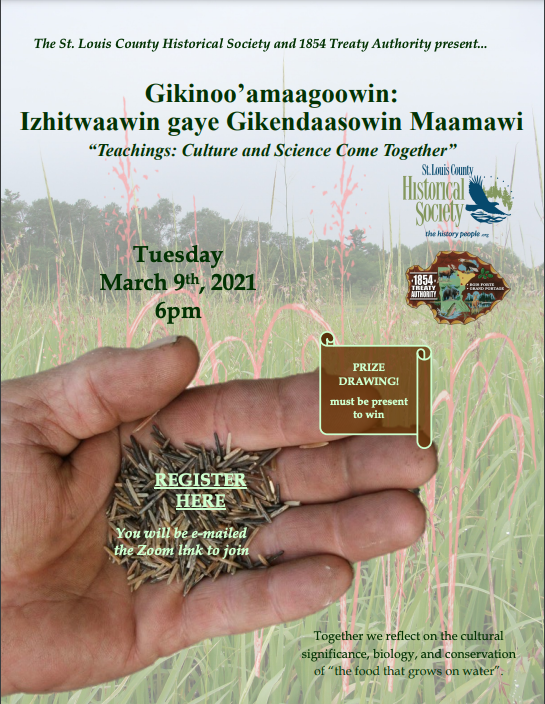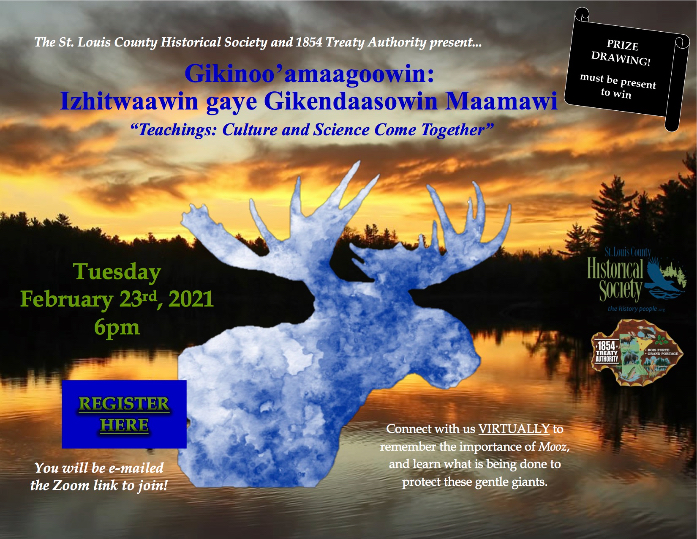1854 Treaty Authority News
The Bad River Band of Lake Superior Tribe of Chippewa Indians in hiring a Wetland Specialist and a Water Resources Program Manager (full annoucement through the links - first page ONLY of vacancies below).
Bad River Application for Employment
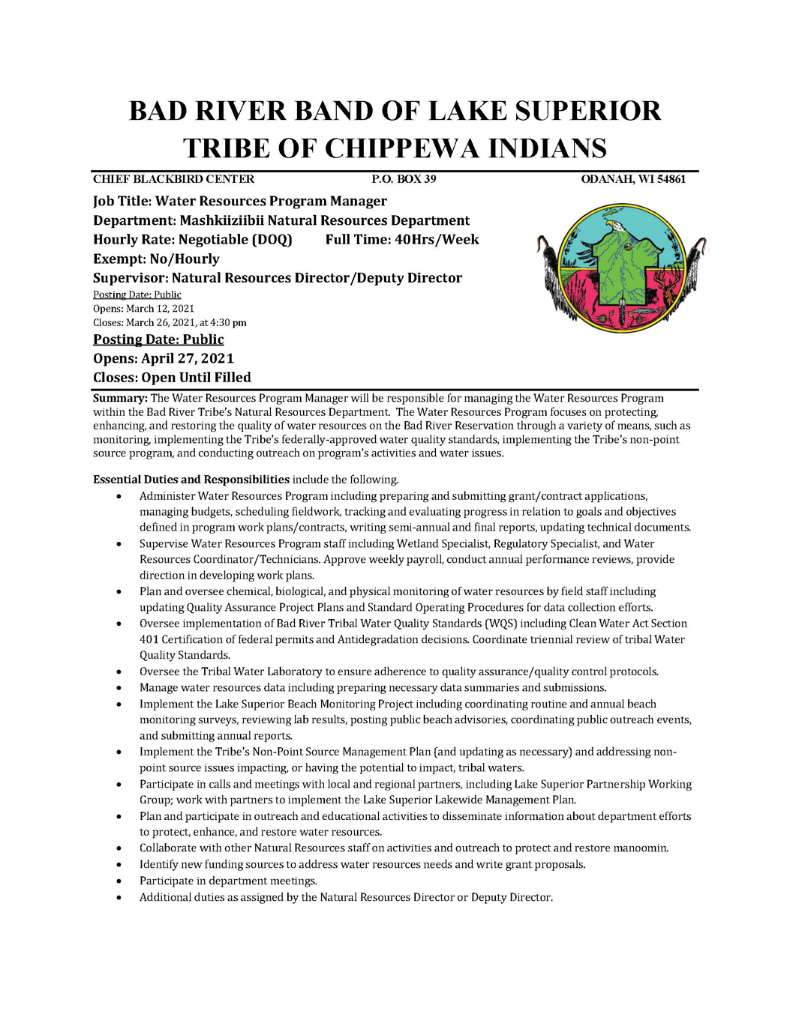
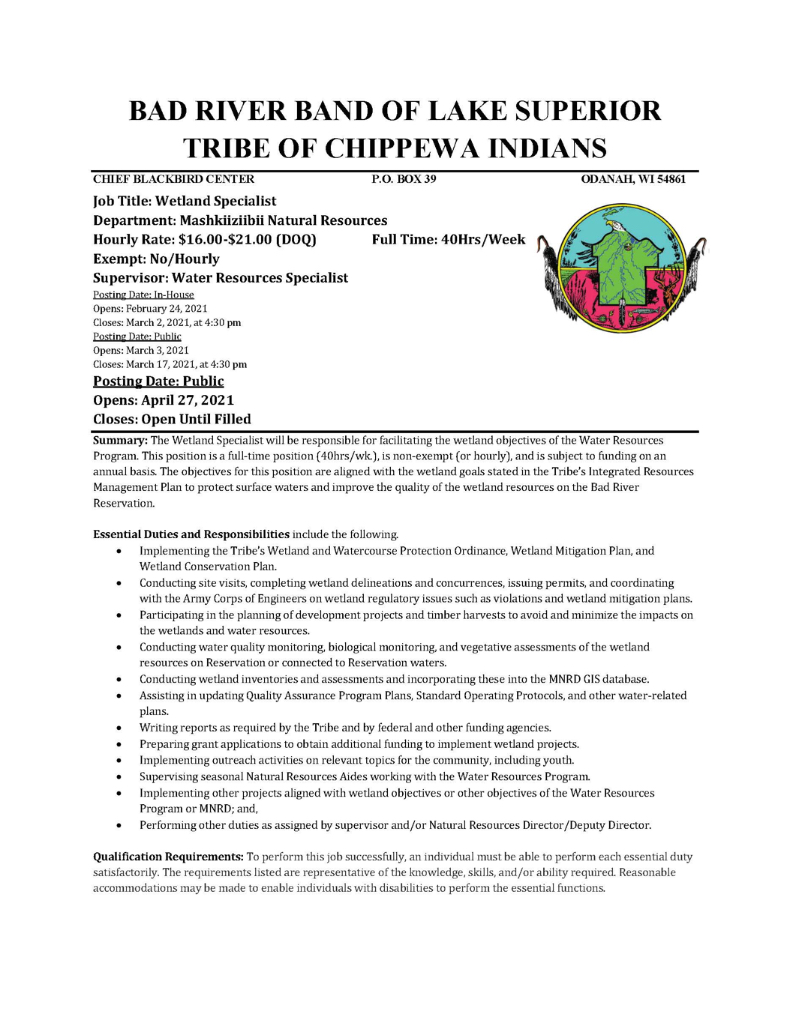
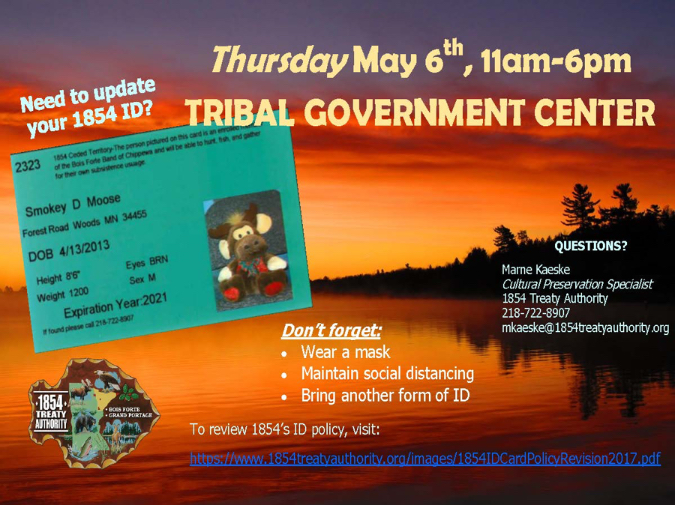
The Grand Portage Band of Lake Superior Chippewa recently launched a website! Stay up to date on community, government, employment, tribal programs and land/resources. Click the image below to check it out:

Eight-week long, stipend-supported, research experience opportunity for undergraduates...
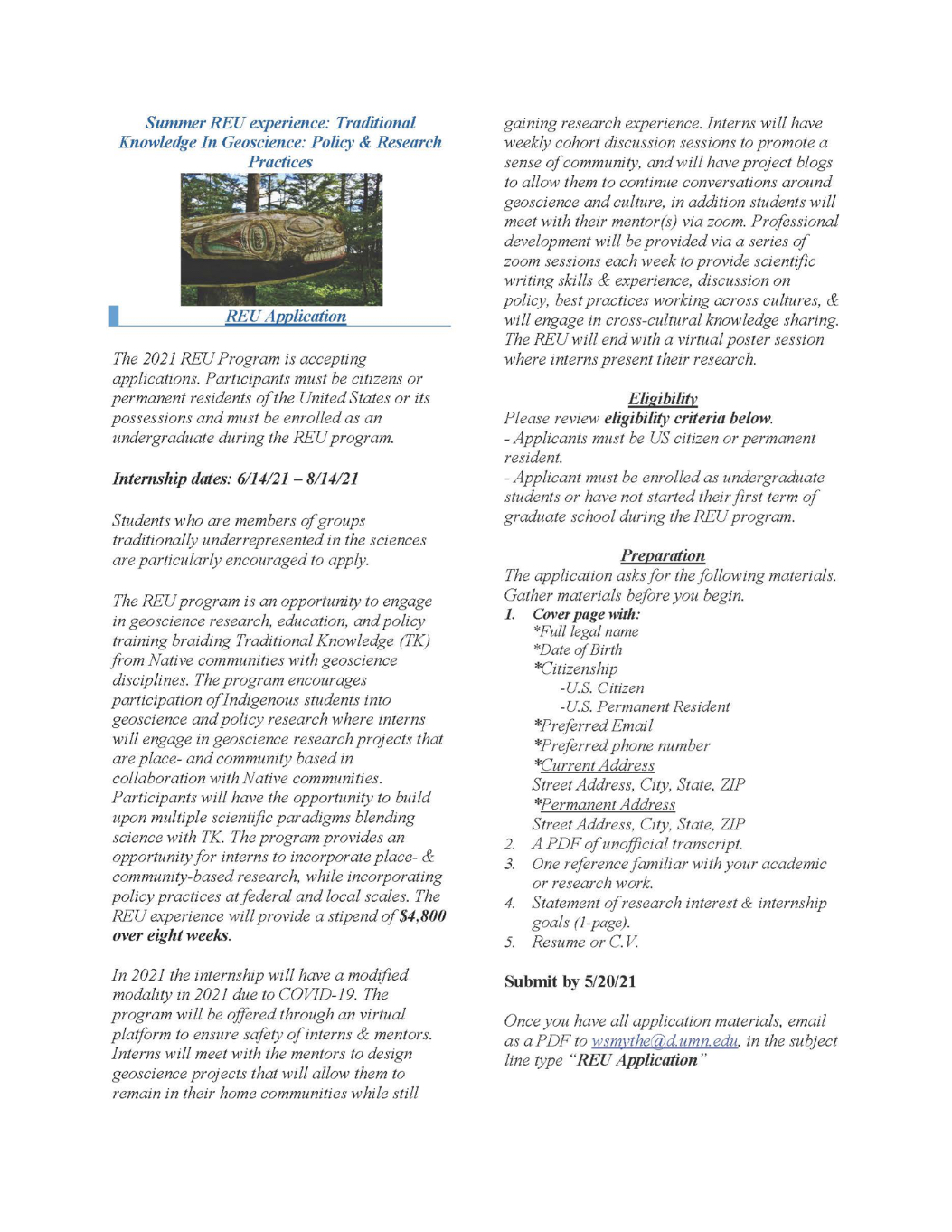

This spring, 1854 will be doing a 'tour' to each of our Researvations to provide 1854 ID's to enrollees who need them:
- VERMILION: Thursday April 15th, 9am-4pm (Vermilion Social Center)
- GRAND PORTAGE: Friday April 30th, noon-6pm; Saturday May 1st, 10am-2pm (Grand Portage Lodge)
- NETT LAKE: Thursday May 6th, 11am-6pm (Tribal Government Center)
*Don't forget to wear a mask, maintain social distencing, and bring another form of ID
To review 1854's ID policy, visit: https://www.1854treatyauthority.org/images/1854IDCardPolicyRevision2017.pdf
**Read 1854's ID card amendment in response to COVID-19 safety protocols
If you have questions, contact: Marne Kaeske, Cultural Preservation Specialist, 1854 Treaty Authority, 218-722-8907,
1854 Treaty Authority's Ziigwan (spring) newsletter is NOW AVAILABLE
It features the wolf status in the 1854 Treaty area, and an alert of potential invasive species carrying moss sold in the aquarium industry. Chief Conservation Officer, Clay Rumph, expects that everyone has had enough time to review the 1854 Ceded Territory Conservation Code over the last year under COVID restrictions, so test your knowledge with the quiz on page 2. Included are the approved 2021-2022 Fishing Seasons, and spring turkey season. Spin through the latest from our Resource Management Division – a summary of all 2020 field work and reports are within!
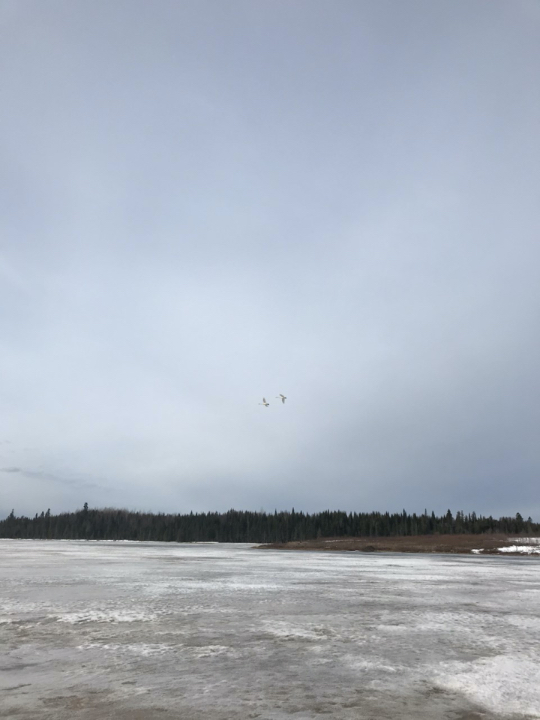
Read the CLEO internship announcement
Read Education internship announcement
*Applications due April 9th, 2021
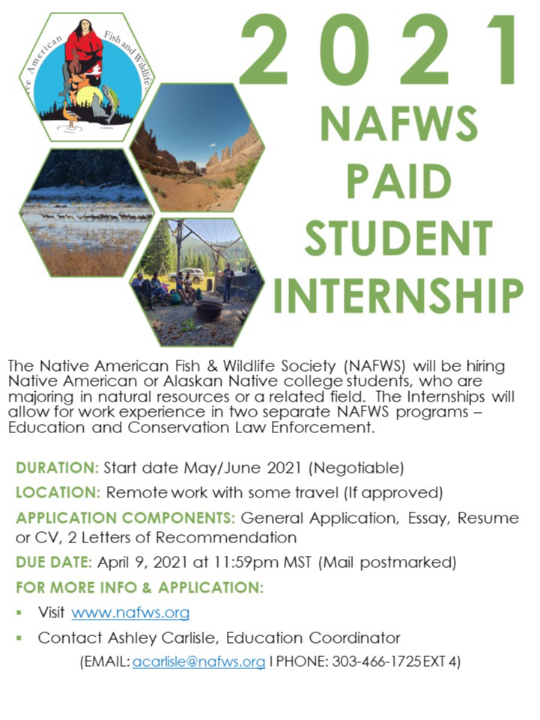
Without getting out and about to powwows over the last year, 1854 has not been as easily accessible as we usually are for creating and distributing 1854 Identification Cards for our enrollees. Although we are currently operating under a Code Amendment where Tribal ID's suffice in place of 1854 ID's for off-reservation harvest, we are planning to make rounds to the reservations. First up, Vermilion on April 15th:
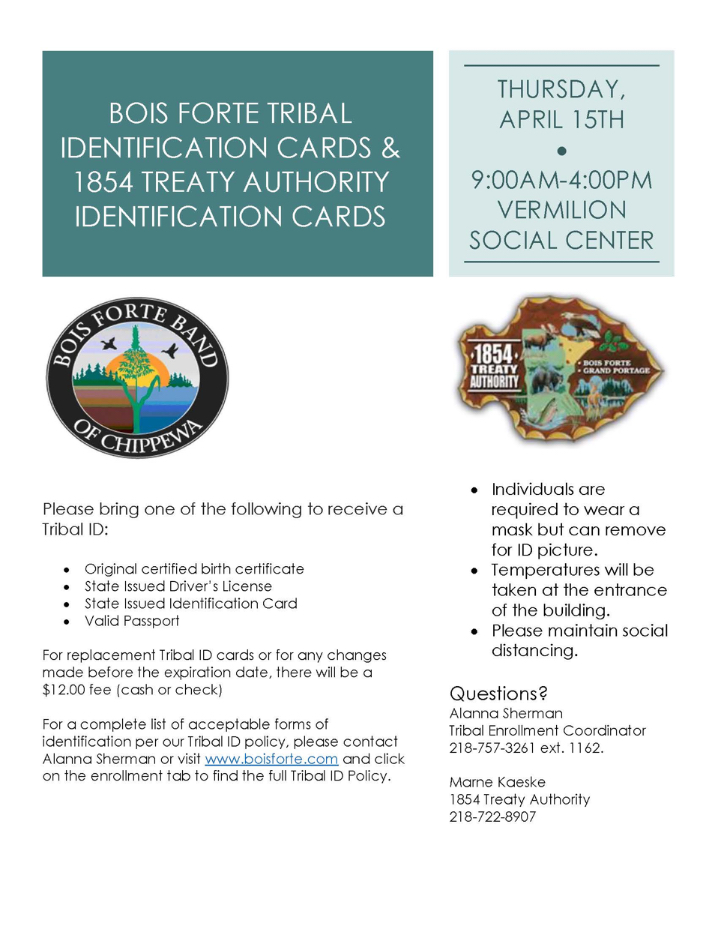
1854's Resource Management Division is hiring three (3) seasonal positions; a Fish and Wildlife Aide position, and two (2) Invasive Species Aide positions. Application materials (including application for employment) are due March 31st, 2021.


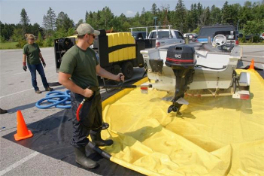
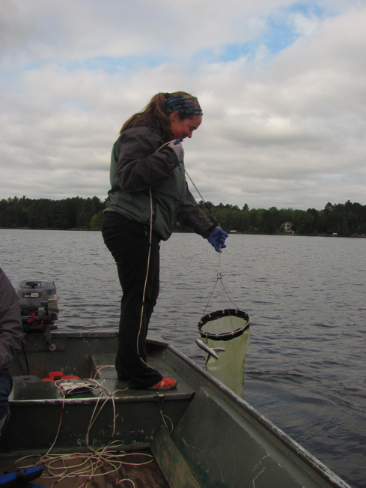
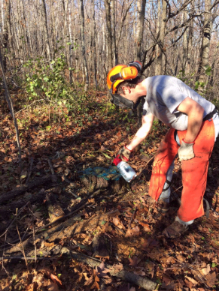
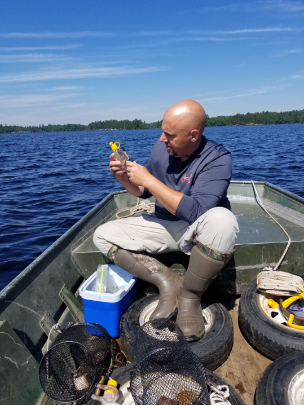
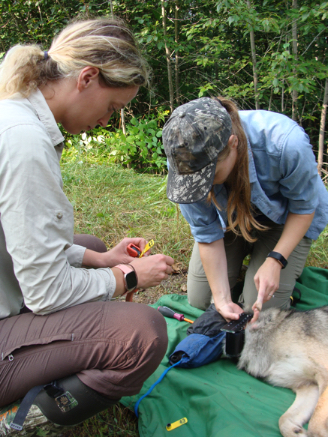
Lake Sturgeon are unique, ancient fish inhabiting the Great Lakes and tributaries. A culturally significant being to the Ojibwe, Lake Sturgeon are a harbinger of spring. Historically abundant populations were nearly eliminated by the early 1900's due to over harvest, water pollution, and habitat loss. Improved water quality by the 1980's allowed state, tribal and federal authorities to reintroduce Lake Sturgeon by stocking hatchery raised fish. Today some watersheds, such as the St. Louis River Estuary, show signs of naturally reproducing populations. Watch the program recording here: https://youtu.be/0VzoAoEawnQ
Seeking more resources about Lake Sturgeon? Check these out:
· Lake Sturgeon StoryMap
· Lake Sturgeon Kahoot!
· Great Lakes Aquarium Run for Your Lifecycle lesson plan
· Great Lakes Aquarium Becoming Scientists: Synthesizing and Communication (Fish CSI) lesson plan
· St. Louis River Alliance flyer: Lake Sturgeon in the St. Louis River
· Menominee Sturgeon Release Feast and Powwow (Menominee are linguistically related to Ojibwe-Algonquin): https://www.youtube.com/watch?v=Yr-ajGIpSzY
· Gun Lake Release-Michigan Pottawatomi (another Algonquin tribe): https://www.youtube.com/watch?v=aRP4li1q88s
· Children’s book: Nanaboozhoo and the Sturgeon
· Ojibwe Clans Project (youth): https://intersectingart.umn.edu/?lesson/44
In the migration of the Anishinaabeg to the Western Lake Superior area, it was prophesied that they would reach their final stopping point when they found “the food that grows on water”. Manoomin (wild rice) is a culturally significant resource and important food source that is critical to Ojibwe identity, historically and presently. Darren Vogt, Resource Management Division Director at the 1854 Treaty Authority, will discuss the biology and conservation of this treaty-reserved food staple, as well as the successes of the organization’s longest monitoring program. Traditional harvest of manoomin occurs each season in the 1854 Ceded Territory; and the process of harvesting and finishing wild rice will also be highlighted in this talk. Watch the program recording here: https://youtu.be/WIqDAd9c4vA
Seeking more resources on Wild Rice? We recommend these:
- 1854 Wild Rice brochure: Manoomin …from lake to table…
- Book: Wild Rice and the Ojibway People
- Book: My Grandfathers Knocking Sticks
- Youth activity book: Wild Rice coloring and activity book
- “Taking Care of Wild Rice” (short film)
- nooshkaachinaagan cut out
- MNOPEDIA: Wild Rice and the Ojibwe (*extensive resource list at the bottom)
- Great Lakes Aquarium: Wild Rice Detective lesson plan
- Wild Rice Kahoot!
- Publication: The Economic Benefits of Wild Rice in Minnesota
- Publication: The Effects of Wild Rice Water Quality Rule Changes on Tribal Health
Are you sugarng this year? If so, consider helping us out:
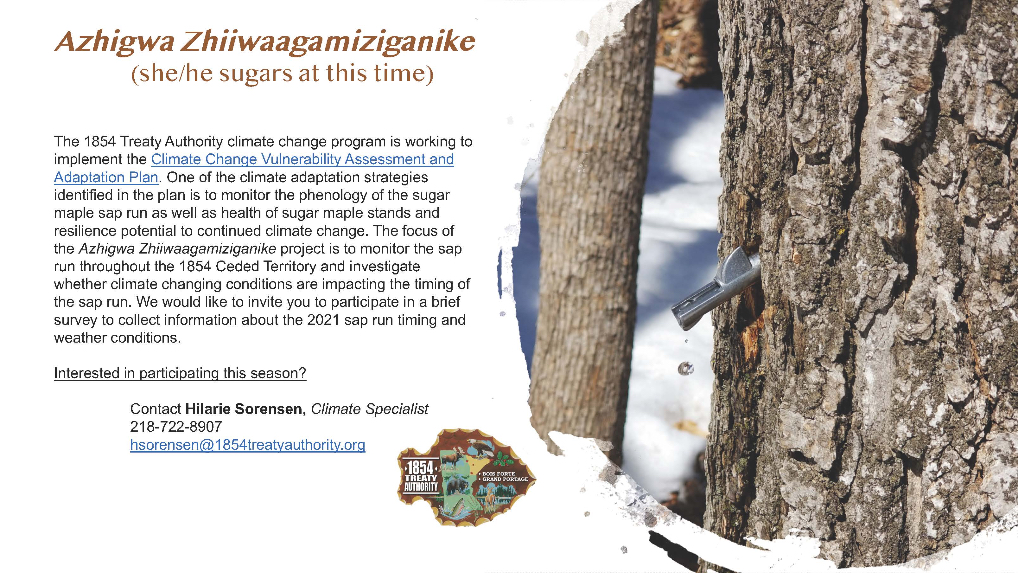
In the Ojibwe world-view, natural resources ARE cultural resources. Seasonal subsistence migration and treaty harvest was and is a way to stay healthy: physically, socially, and spiritually. However, warmer winters, increasing extreme precipitation events, more occurrences of drought, and earlier ice out dates across the 1854 Ceded Territory already are affecting flora and fauna that are imperative to the culture, history, well-being, and life-ways of the Anishinaabeg. 1854 Treaty Authority Climate staff, Hilarie Sorensen and Tyler Kaspar, share some of the documented changes in weather patterns in the region. They will discuss the various monitoring projects that 1854 facilitates to watch over these changes, such as measuring ice thickness and snowpack, recording inland lake temperature and dissolved oxygen levels, and the timing of phenological events like wild rice growth, annual sugar maple sap run, and amphibian spring calling. Watch the recorded program here: https://youtu.be/GqdVL4qoMi4
Seeking more resources about climate change or subsistence seasonal rounds? Check these out:
- SLCHS Learning Guide: Ojibwe Seasonal Rounds
- Book: Cecilia; The Trials of an Amazing Ojibwe Woman 1834-1892
- “Iskigamizigedaa!” (Let’s Boil Maple Sap) (youth coloring storybook)
- Sugarbush 101 (short film)
- Makak and Zhiishiigwaans cut outs
- 1854 Ceded Territory Vulnerability Assessment and Adaptation Plan
- “Dibaginjigaadeg Anishinaabe Ezhitwaad” (A Tribal Climate Adaptation Menu)
Prairie Island Indian Community has an Environmental Technician position vacancy. Applications are due March 19.
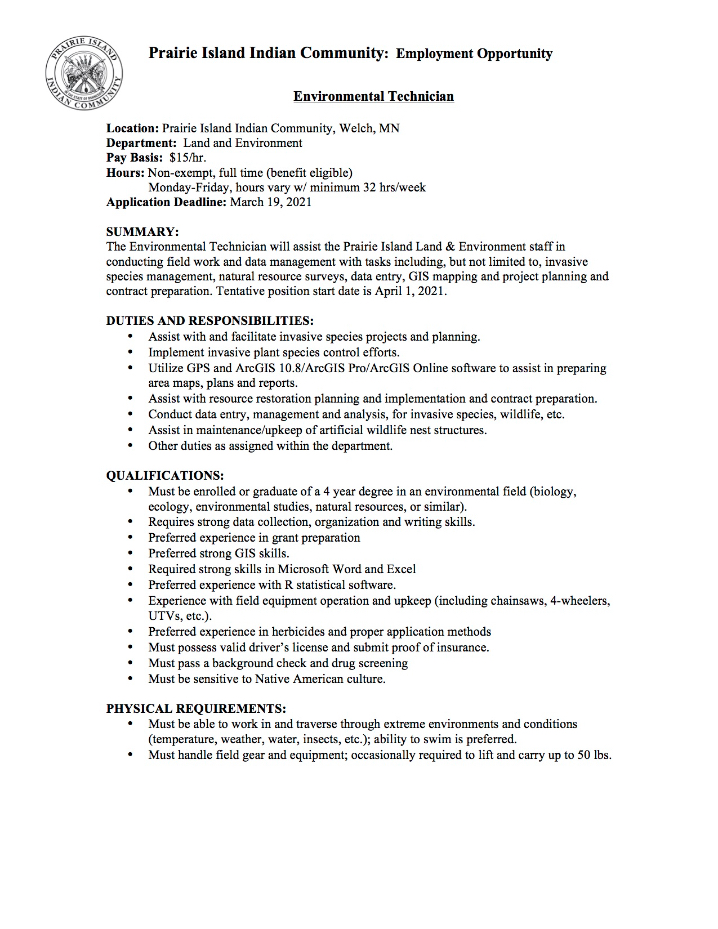
Students can intern with the BIA, Tribe or a Tribal related program: Student Trainee (Pathways) GS-0399-2/3/4
To widen the pathways for careers pertaining to the Stewardship of Trust assets and tribal resources.
- Environmental
- Archeology
- Natural Resources Management and Biological Sciences
- Cartographic
- Rangeland or Agriculture Management
- Soil Conservation
- Forestry
- Accounting
- Civil Engineering
- Petroleum Engineering
- Legal Instruments Examining
- Realty
- Irrigation System Operation
- Hydrology
Refer to the job vacancy announcement on USAJOBS for the specific education and eligibility qualification requirements.
Minnesota moose range lies almost entirely within the 1854 Ceded Territory. The area moose population used to be as large as 10,000 animals, however numbers have dropped dramatically within the last two decades. The harvest of one moose provides for more than just one family; a whole community can be sustained through sharing. 1854 Wildlife Biologist, Morgan Swingen, sheds some light on the current threats to moose and discusses the various monitoring programs that 1854 Treaty Authority participates in, such as annual aerial moose surveys, moose habitat restoration and browse assessments, and white tail deer parasite monitoring. Watch the recorded program here: https://youtu.be/fuWQP9Fha5s
Haskell Environmental Research Studies announces (HERS) Institute’s summer internship program. The HERS program is aimed at preparing American Indian/Alaska Native/Native Hawaiian undergraduate students for graduate study by assisting them to create a research project related to climate and environmental change in Indigenous communities. Native students eligible to enroll in tribal colleges are encouraged to apply. HERS 2021 applications are now open. All application materials are due March 5, 2021. Students can learn more and apply to the HERS 2021 summer internship program here: http://hersinstitute.org/apply.html
See the PROGRAM FLYER

